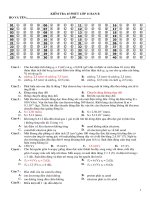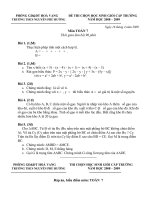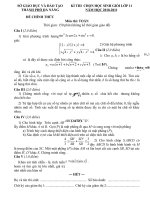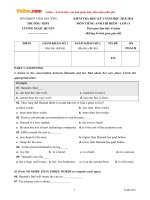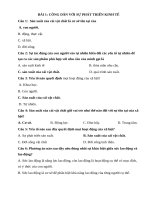TA lop 11 thi diem bai 7 co DA
Bạn đang xem bản rút gọn của tài liệu. Xem và tải ngay bản đầy đủ của tài liệu tại đây (70.28 KB, 4 trang )
Read the passage carefully and choose the correct answer.
It has been thought that women are the second class in citizen, and men are the
first. There is not a real equality of opportunity for men and women. Years ago, people
were living in a man-dominated society. Women had to obey their husbands and
fathers absolutely. Women's place was in the kitchen and women's work was
housework. In many places, women were not even' allowed to go to school. Women
had no rights, even the right to choose husband for themselves. Men usually occupied
high positions in society so they thought they were more intelligent than women. Men
often considered women as their property. Sometimes, they were mistreated by their
husbands and suffered the problem as a fate. Many parents did not even want to
daughters.
Despite the progress, there remain outdated beliefs about women's roles,
traditionally passed down from generation to generation. Men are commonly seen as
the strong bodies, bread-winners in the family and key leaders in society, while women
are restricted to being housewives and child bearing and care, and housework such as
washing and cooking.
According to social surveys, many women in the 21st century still have to work
over 12 hours a day including working in offices and doing countless household chores
without any help from their husbands. In some regions, the labor of women is not
recognized despite the hardships they endure to support the whole family. Moreover,
women are the direct victims of family violence, especially in rural areas.
Thanks to the women's liberation movement, nowadays women have proved that
they are equal to men in every aspect. An average woman has weaker muscles than
an average man but she may be as intelligent as he is. Women can do everything that
men can, and women can do one thing that no man can: they produce children.
1. Which is not women's role in the former days?
a. Working in authority
b. Doing housework
c. Doing cooking
d. Bearing and rearing children
2. Years ago, women are not allowed ________.
a. to work in the kitchen
b. to go to school
c. to do housework
d. to stay at home with their parents
3. What did women have to suffer?
a. Good schooling
b. Choosing a husband themselves
c. Enjoy their housework
d. Illiteracy
4. The outdated 'beliefs about women's roles ________.
a.have been eradicated completely
b. disappeared soon after the women's liberation movement
c. still exist at present .
d. was forced to change after the women's liberation movement
5. According to the text, women in the 21st century ________.
A. do not have to do housework any more
B. are still the victims of family violence in some rural areas
C. get help from their husbands with all housework
D. spend less than 12 hours working outside the home and doing housework
Fill in each numbered blank with one suitable word or phrase.
Years ago, in their private family role, women quite often dominate the male
members of the household. Women were quite (6) _____ to their families. However,
the public role of women has changed (7) _____ since the beginning of World War II.
During the war, men were away from home to the battle. As a (8) ____, women
were in complete control of the home. They found themselves doing double and
sometimes triple (9) _____. They began to take over the work of their absent husbands
and to work outside. They accounted for 73% of the industrial labor force. Women
were forced by economic realities to work in the factories. The women who worked
there were (10) _____ low wages, lived in crowded and small dormitories. (11) _____,
they found themselves a place as active members of society. Women, although they
were ruthlessly exploited, became the key to the country's success.
The feminist movement seems to have been (12) _____ important part in the
demands (13) _____ women Equal Rights. The movement tends to have a way of
changing men and women and their roles in society. It often redefines the role of
women in society. Inventions, too, bring progress in society as (14) _____ as to the
individual's life. In the late nineteenth century the invention of the typewriter gave
women a new skill and a. job outside the home. The Suffragettes in the turn of the
century has become a (15) _____ for most women to be engaged in equality.
6. a. fascinated
b. worried
c. dedicated
d. interested
7. a. unfortunately
b. approximately
c. nearly
d. dramatically
8. a. change
b. result
c. success
d. opportunity
9. a. duty
b. job
c. requirement
d. career
10. a. made
b. paid
c. created
d. delivered
11. a. Because
b. Therefore
c. However
d. So
12. a. a
b. an
c. the
d. Ø
13. a. for
b. in
c. with
d. against
14. a. much
b. long
c. soon
d. well
15. a. present
b. souvenir
c. symbol
d. role
Người ta đã nghĩ rằng phụ nữ là lớp thứ hai trong công dân, và đàn ông là người đầu tiên.
Khơng có một cơ hội bình đẳng thực sự cho nam giới và phụ nữ. Nhiều năm trước, mọi
người đang sống trong một xã hội do con người thống trị. Phụ nữ phải vâng lời chồng và
cha tuyệt đối. Nơi của phụ nữ là trong nhà bếp và công việc của phụ nữ là việc nhà. Ở
nhiều nơi, phụ nữ thậm chí khơng được phép đến trường. Phụ nữ khơng có quyền, thậm
chí có quyền chọn chồng cho mình. Đàn ông thường chiếm vị trí cao trong xã hội nên họ
nghĩ rằng họ thông minh hơn phụ nữ. Đàn ông thường coi phụ nữ là tài sản của họ. Đôi
khi, họ bị chồng đối xử tệ bạc và phải chịu đựng vấn đề như một định mệnh. Nhiều cha
mẹ thậm chí khơng muốn con gái.
Mặc dù tiến bộ, vẫn có những niềm tin lỗi thời về vai trò của phụ nữ, theo truyền thống được
truyền từ thế hệ này sang thế hệ khác. Đàn ông thường được coi là những người mạnh
mẽ, là người chiến thắng trong gia đình và là người lãnh đạo chủ chốt trong xã hội, trong
khi phụ nữ bị hạn chế làm bà nội trợ và chăm sóc và chăm sóc trẻ em, và làm việc nhà
như rửa và nấu ăn.
Theo các khảo sát xã hội, nhiều phụ nữ trong thế kỷ 21 vẫn phải làm việc hơn 12 giờ mỗi ngày
bao gồm làm việc tại văn phịng và làm vơ số cơng việc gia đình mà không cần bất kỳ sự
giúp đỡ nào từ chồng. Ở một số vùng, lao động của phụ nữ không được cơng nhận mặc
dù những khó khăn họ phải chịu đựng để hỗ trợ cả gia đình. Hơn nữa, phụ nữ là nạn nhân
trực tiếp của bạo lực gia đình, đặc biệt là ở khu vực nông thôn.
Nhờ phong trào giải phóng phụ nữ, ngày nay phụ nữ đã chứng minh rằng họ bình đẳng với đàn
ơng về mọi mặt. Một người phụ nữ trung bình có cơ bắp yếu hơn một người đàn ơng
trung bình nhưng cơ ấy có thể thơng minh như anh ta. Phụ nữ có thể làm mọi thứ mà đàn
ơng có thể, và phụ nữ có thể làm một điều mà khơng người đàn ơng nào có thể làm: họ
sinh con.
Years ago, in their private family role, women quite often dominate the male
members of the household. Women were quite dedicated to their families. However,
the public role of women has changed dramatically since the beginning of World War
II.
During the war, men were away from home to the battle. As a result, women were
in complete control of the home. They found themselves doing double and sometimes
triple duty. They began to take over the work of their absent husbands and to work
outside. They accounted for 73% of the industrial labor force. Women were forced by
economic realities to work in the factories. The women who worked there were paid
low wages, lived in crowded and small dormitories. However, they found themselves a
place as active members of society. Women, although they were ruthlessly exploited,
became the key to the country's success.
The feminist movement seems to have been an important part in the demands for
women Equal Rights. The movement tends to have a way of changing men and
women and their roles in society. It often redefines the role of women in society.
Inventions, too, bring progress in society as well as to the individual's life. In the late
nineteenth century the invention of the typewriter gave women a new skill and a. job
outside the home. The Suffragettes in the turn of the century has become a symbol for
most women to be engaged in equality.
Nhiều năm trước, trong vai trị gia đình riêng tư của họ, phụ nữ khá thường xuyên thống trị
các thành viên nam trong gia đình. Phụ nữ khá tận tâm với gia đình. Tuy nhiên, vai trò
cộng đồng của phụ nữ đã thay đổi đáng kể từ đầu Thế chiến II.
Trong chiến tranh, những người đàn ông xa nhà đến trận chiến. Do đó, phụ nữ hồn tồn kiểm
sốt nhà. Họ thấy mình làm nhiệm vụ gấp đôi và đôi khi gấp ba. Họ bắt đầu tiếp quản
công việc của những người chồng vắng mặt và đi làm việc bên ngoài. Họ chiếm 73% lực
lượng lao động công nghiệp. Phụ nữ bị ép buộc bởi thực tế kinh tế để làm việc trong các
nhà máy. Những người phụ nữ làm việc ở đó được trả lương thấp, sống trong những ký
túc xá đông đúc và nhỏ bé. Tuy nhiên, họ thấy mình là một thành viên tích cực của xã hội.
Phụ nữ, mặc dù họ bị bóc lột một cách tàn nhẫn, đã trở thành chìa khóa thành cơng của
đất nước.
Phong trào nữ quyền dường như là một phần quan trọng trong nhu cầu địi quyền bình đẳng
của phụ nữ. Phong trào có xu hướng thay đổi đàn ông và phụ nữ và vai trị của họ trong
xã hội. Nó thường xác định lại vai trò của phụ nữ trong xã hội. Các phát minh cũng vậy,
mang lại sự tiến bộ trong xã hội cũng như cuộc sống của mỗi cá nhân. Vào cuối thế kỷ XIX,
việc phát minh ra máy chữ đã cho phụ nữ một kỹ năng mới và a. công việc ngoài nhà.
Suffragettes vào đầu thế kỷ đã trở thành một biểu tượng cho hầu hết phụ nữ tham gia
vào sự bình đẳng.
